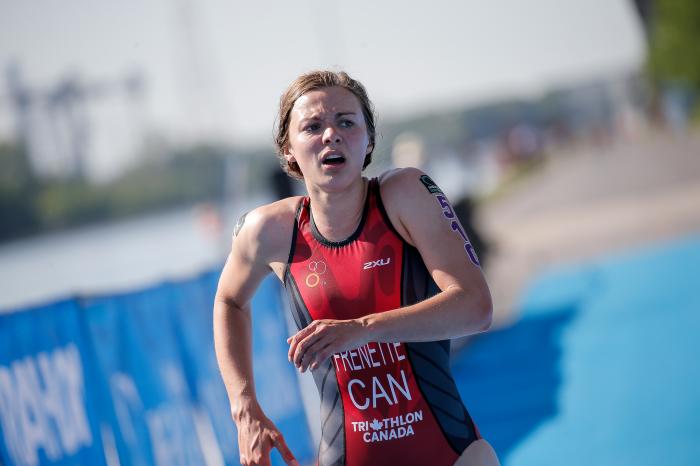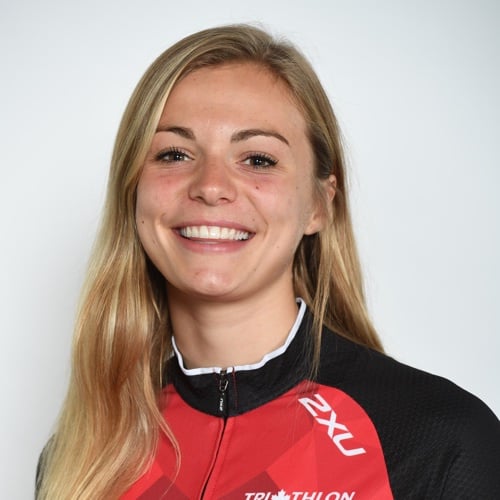Paralympic contender Kamylle Frenette “never thought of her club foot as being a handicap”
Kamylle Frenette’s leap of faith into Para triathlon
 Photo by:
World Triathlon
Photo by:
World Triathlon
This weekend, in a story posted on cbc.ca, Canadian national team Para triathlete Kamylle Frenette shared her feelings about competing as a Para triathlete. Relatively new to Para triathlon racing – she was approached by national Para coach Carolyn Murray about joining the Para triathlon program, and she’s since gone on to two consecutive fourth-place finishes at the Para triathlon world championships.
In September, 2019, just before the second of those oh-so-close-to-the-podium finishes, we profiled Frenette in the September issue of Triathlon Magazine Canada:
Para Power: Kamylle Frenette’s Leap of Faith into Para triathlon
Kamylle Frenette never thought of her club foot as being a handicap, so she was surprised at the suggestion of joining Para triathlon. But as a member of Triathlon Canada’s National Team for over a year now, Frenette has stepped onto many podiums and she’s very proud to represent her country.
Frenette’s club foot is two sizes smaller than her other foot, but that was never a big deal in her family.
“My parents were really easy-going about it,” she says. “I just knew my foot was smaller, that’s all, and when trying on shoes, it would be noticeable. I have always been running in the same size shoes and I just adapted and got used to that.”

While growing up in New Brunswick, Frenette enjoyed many sports including volleyball and ringette. Inspired by her dad’s love of triathlon, she took that on when she was 16 years old and completed an Ironman 70.3 out in Calgary just before her 18th birthday.
While earning a biology degree at the University of Moncton, Frenette was on the varsity cross-country team from 2014 to 2018. Late in 2016, a coach from Triathlon Canada talked to her about possibly becoming a Para triathlete.
“It was a bit of a shock to me,” Frenette recalls of that conversation. She did complete the para classification test early in 2017 in Sarasota, Florida, but had doubts about making this big change.
“It was kind of a scary idea at first to change my identity to become a para-athlete,” she explains.
A year later, she was classified again, but this time there was no hesitation. Frenette did her first sprint with the Canadian team right there in Sarasota and took second place in the PTS5 category. Frenette racked up more fast finishes in 2018 with a second at France’s World Para-Triathlon Cup; a first at the Para-Triathlon Cup in Magog, Quebec; second at the Para-Triathlon World Series in Edmonton; and fourth at the Para-Triathlon World Championship in Australia.
Related: Stefan Daniel named Triathlon Canada Triathlete of the Year
Frenette is really happy with her high performance and, along the way, she began to notice a difference compared to that 70.3 race she did in Calgary.
“The Ironman was a personal objective and I just wanted to finish, but now I was wearing a Team Canada suit and that was a different kind of pressure,” she recalls.
Now a pharmacy student at Dalhousie University, Frenette’s days are full.
“I’m pretty busy, but I fit it all in,” Frenette explains. “I move very fast during the day, but I like it.”
She splits her workouts between campus and the Canada Sports Centre in Halifax and, during school breaks, she heads out to the National Training Centre in Victoria.
Frenette’s running shoes are the same size with an insert, but her cycling shoes are different sizes. While training she works on her balance because her right leg is unique – not just with a club foot, but also with a smaller calf, a bit less strength and about half the mobility in the ankle.
Her training took a setback after a crash in the Para Triathlon World Championship in Australia last fall.
“I got out of the water way further ahead than I was expecting and I was pretty excited, so I got going a little too fast on the bike,” she explains. “There was a really sharp turn and I took it too fast.”
Frenette’s arm hurt really badly, but she quickly picked up the bike and got going again. She had the fastest run in the race and finished fourth, despite learning that her sore arm was actually a radial head fracture. It took over three months, and a lot of physio, before Frenette was back to normal training.
But this enthusiastic Canuck remains very positive about that race: “As far as a mental test,” she says, “I know that no matter what happens, I can continue and finish even if things don’t go well.”
She is proud that she didn’t quit and knows the experience will support her during future difficulties.
Her current goal is to qualify for the Tokyo 2020 Paralympics. As Frenette meets many other para-athletes from around the world, she’s inspired by the difficulties they have overcome. “It opens your eyes to another side of things,” she says. “Seeing their independence and determination, it is very motivating to see what they’re accomplishing.”
And, no doubt Frenette herself is inspiring others around the globe and here at home, with the commitment to push her athletic performance even more and to represent Canada with pride.
